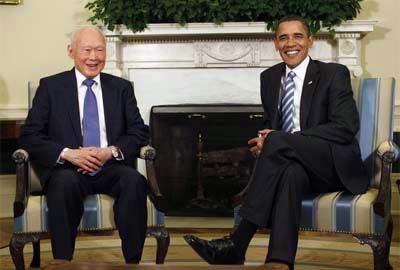Lee reminded his audience that he had lived through some epoch making changes: British colonisation; Japanese military conquest and occupation of East Asia that shattered Western colonial empires; the Cold War between the US/western Europe and the Soviet Bloc; and the dissolution of the Soviet empire.
And now, he said, the world was in the midst of another momentous transformation.
Lee’s point was that when President Barack Obama announced at the Pittsburgh G20 Summit that G20 would replace G8, what he did was acknowledge the end of the post-World War II world order. ‘An American President’, he said, ‘has taken a realistic view of the changed world, although for the next two to three decades, America will remain the sole superpower.’
‘No one’ he added, ‘can predict how the G-20 will evolve. It does not herald a multi-polar world with parity between the different poles. Europe, a large economy, is no longer a global strategic actor. India and Brazil have influence in their own regions. Russia is a major nuclear power with vast quantities of oil and gas and control of gas pipes across Eastern and Western Europe, and China will have global heft and influence in two decades. But, a changed world order is upon us.’
Lee’s point is yet too little understood and rarely so well made as it was in his speech.
The implications Lee sees for East Asia are equally important.
China’s rise is one facet of East Asia’s modernisation growth story that began with rise Japan and the Meiji Revolution in 1868. In China, it began in December 1978 with the open-door policy of Deng Xiaoping. India opened up to the world in 1991. China and India can and will catch up with the West in science and technology. They will restore Asia to its leading position before European colonialism enveloped them. The world order will be re-balanced.
‘Growth has created growing strategic complexity between China, Japan, South Korea, India, ASEAN and Australia. Each will try to position itself to achieve maximum security, stability and influence. The consensus in ASEAN is that the US remains irreplaceable in East Asia. But it can no longer be alone and manage the new complexities to maintain stability.’
Hence, he noted, the search for some new architecture, such as the concept of a community in East Asia.
It has several manifestations: APEC, ASEAN+3, the East Asia Summit, Australia’s Prime Minister Rudd’s notion of an Asia Pacific community and, recently, Japanese Prime Minister Hatoyama’s vaguely-defined East Asian Community.
‘Community’ is too amorphous a term to describe the search for a new architecture. But the underlying strategic concerns that led to these proposals are real.
Lee concluded that it would be a serious mistake for the region to define East Asia in closed or, worse, in racial terms. In building any new East Asian architecture, the US must be an important part of it.
‘China is not ready or willing to assume equal responsibility for managing the international system. The US is still the world’s largest economy and market of last resort. The US dollar will remain as the premier international reserve currency, although the Euro, China’s RMB, Japan’s Yen and others will also eventually become reserve currencies. But it will take time to rebalance global savings and global consumption, especially China’s. But it must happen and will happen.’

